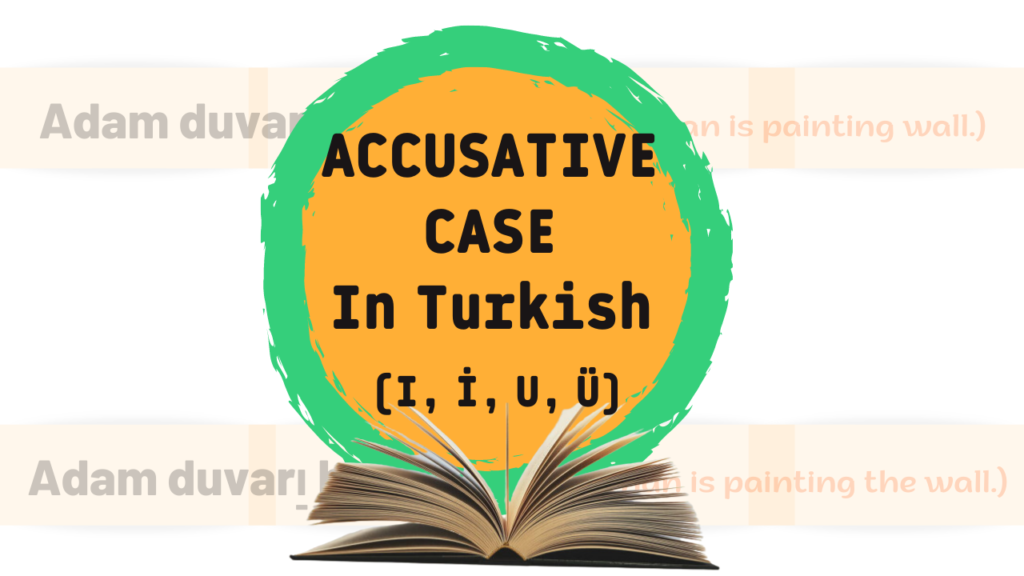1. When to use accusative case in Turkish (ı i u ü suffixes) and What Is It?
In this course; you’ll learn what does ı i u ü suffixes mean and when to use accusative case in Turkish”.
Sometimes the sentence can be meaningful when you use this suffix or not, but you should be careful whether you use the suffix according to the meaning you mean. When this suffix comes to the end of the word, it adds the meaning of “object specified, indicated, pointed out”. If you have used this suffix with a word, it means that you have taken it out of the general and you are specifying it in particular. You will understand clearly with this example.

In the first sentence: The man is painting any wall. Which wall is unknown, it does not matter. We only understand that the man is painting a wall.
In the second sentence: In this sentence, the person saying the sentence knows which wall the man is painting and points to that wall. It draws attention to a single wall there. He is not talking about a general wall, we can understand that there is a particular wall he specifically mentions, thanks to the suffix –ı. In fact, we can say that it has a similar task to the English word “the“.
2. What Are The Rules About That Case?
- Accusative case suffix can seem in 4 different forms: ı i u ü. It changes according
 to vowel harmony. If the last vowel is a or ı suffix will be ı, if the last vowel is e or i suffix will be i, If the last vowel is o or u suffix will be u, If the last vowel is ö or ü suffix will be ü.
to vowel harmony. If the last vowel is a or ı suffix will be ı, if the last vowel is e or i suffix will be i, If the last vowel is o or u suffix will be u, If the last vowel is ö or ü suffix will be ü. - If word end with “p, ç, t or k” they will become to “b, c, d, g“. This rule is about consonant harmony. If you have questions about consonant harmony check this article. E.g. Bebek (baby) > Bebeği (the baby)
- If word end with a vowel you have to put a “y“ between word and accusative case suffix. (Since two vowels can not be side by side in Turkish.)
- The word with accusative case suffix gives the answer to the questions “Neyi?(what), Kimi? (Who) Nereyi? (where)”. Here are some sample sentences that we have prepared for you.
3. Example Sentences
SAMPLE SENTENCE 1: Trafikte kemerini tak. (Put on your seatbelt in traffic.)
QUESTION: Neyi tak? (Put what?)
ANSWER: kemerini (your seatbelt)
SAMPLE SENTENCE 1: Tahtayı göremiyorum. (I can’t see the board.)
QUESTION: Neyi göremiyorum? (What can’t I see?)
ANSWER: Tahtayı (the board)
SAMPLE SENTENCE 2: Seni çok seviyorum. (I love you so much)
QUESTION: Kimi seviyorum? (Who do I love?)
ANSWER: Seni (you)
SAMPLE SENTENCE 3: Şu an seni bekliyorum. (I’m waiting for you right now.)
QUESTION: Kimi bekliyorum? (Who am I waiting for?)
ANSWER: Seni (you)
SAMPLE SENTENCE 4: Şu yatağı topla. (Tidy this bed.)
QUESTION: Neyi topla? (Tidy what?)
ANSWER: Yatağı (the bed)
SAMPLE SENTENCE 5: İstanbul’u çok seviyorum. (I love İstanbul so much.)
QUESTION: Nereyi seviyorum? (Where do i love?)
ANSWER: İstanbul’u (İstanbul )
SAMPLE SENTENCE 6: Yemeği ısıtıyorum. (I’m warming the food.)
QUESTION: Neyi? (What?)
ANSWER: Yemeği (the food)
SAMPLE SENTENCE 7: Evi temizliyorum. (I am cleaning the house.)
QUESTION: Neyi? (What?)
ANSWER: Evi (the house)
SAMPLE SENTENCE 8: Bardağı yıkıyorum. (I’m washing the glass.)
QUESTION: Neyi? (What?)
ANSWER: Bardağı (the glass)
SAMPLE SENTENCE 9: Bu elbiseyi istiyorum. (I want this dress.)
QUESTION: Neyi? (What?)
ANSWER: elbiseyi (the dress)
SAMPLE SENTENCE 10: Şu kalemi verir misin? (Can you give me that pencil?)
QUESTION: Neyi? (What?)
ANSWER: kalemi (the pencil)
SAMPLE SENTENCE 11: Kalemi alabilirsin. (You can have the pen.)
QUESTION: Neyi? (What?)
ANSWER: Kalemi (the pencil)
SAMPLE SENTENCE 12: Bu konuyu anlamıyorum. (I don’t understand this issue.)
QUESTION: Neyi? (What?)
ANSWER: konuyu (the issue)
SAMPLE SENTENCE 13: Ben seni anlamıyorum. (I don’t understand you.)
QUESTION: Kimi? (Who?)
ANSWER: seni (you)
SAMPLE SENTENCE 14: Şu salatayı da ye. (Eat that salad too.)
QUESTION: Neyi? (What?)
ANSWER: salatayı (the salad)
SAMPLE SENTENCE 15: Camları siliyorum. (I’m cleaning the windows.)
QUESTION: Neleri? (What?)
ANSWER: Camları (the windows)
SAMPLE SENTENCE 16: Çiçekleri suluyorum. (I water the flowers.)
QUESTION: Neleri? (What?)
ANSWER: Çiçekleri (the flowers)
If you say that i still don’t understand accusative case in Turkish, don’t worry. It is one of the most difficult grammatical issues to be encountered while learning Turkish. Of course, it may take time to get used to this structure, to understand and use it in the right place. So instead of getting discouraged, you can start practicing a lot. You can overcome it with time by reading, hearing, speaking.
If you have any question about Turkish language just let me know in the comment below. Btw we also share all Turkish grammar lessons, some daily usefull tips, Turkish idioms and more about Turkish language and Turkish culture on YouTube channel! You can watch all lessons for free now! Just click here and subscribe to don’t lose our videos. See you in another lesson!

